|
|
|
Sort Order |
|
|
|
Items / Page
|
|
|
|
|
|
|
| Srl | Item |
| 1 |
ID:
120718


|
|
|
|
|
| Publication |
2013.
|
| Summary/Abstract |
Abstract Not only is the participation of developing countries in international trade negotiations growing, so is their influence over the global trade agenda. This article highlights the increasing activism and impact of African states through a detailed study of the current Economic Partnership Agreement (EPAs) negotiations with the European Union (EU). In examining African resistance to EPAs, the article develops a constructivist approach to North-South trade negotiations that pays close attention to the role of development discourses. We argue that the growing willingness of African states to challenge the EU to deliver on its development promises during the decade-long EPA process was crucial to informing their sustained opposition to the EU's goal of completing a comprehensive set of sub-regional economic agreements. We document African resistance to EU trade diplomacy in the EPAs, exploring how these otherwise weak countries were able to pursue normative-based negotiation strategies by recourse to the EU's promise of a 'development partnership.'
|
|
|
|
|
|
|
|
|
|
|
|
|
|
|
|
| 2 |
ID:
120720
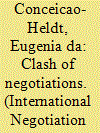

|
|
|
|
|
| Publication |
2013.
|
| Summary/Abstract |
Abstract While the number of preferential trade agreements (PTA) has increased rapidly in recent years, the Doha round of multilateral trade negotiations has been deadlocked since 2006. Most PTAs were even concluded after the start of the Doha round. Does the shift to PTAs "marginalize" the multilateral system? And is there a clash between preferential and multilateral trade liberalization? To answer these questions, we build upon negotiation analysis literature, arguing that the proliferation of PTAs draws negotiating capacity away from the multilateral level and thus reduces the incentives to agree on multilateral trade agreements. The willingness of actors to move from their initial bargaining positions and make concessions at the multilateral level depends on their outside options, that is, their best or worst alternatives to a negotiated agreement. The more credible an actor's argument that he has a good alternative to multilateralism, the greater his bargaining power will be. In order to support the argument we will analyze the negotiation process at the multilateral level and link it to PTAs under negotiation by the EU, US, Brazil, Australia, and India.
|
|
|
|
|
|
|
|
|
|
|
|
|
|
|
|
| 3 |
ID:
120721
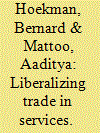

|
|
|
|
|
| Publication |
2013.
|
| Summary/Abstract |
Abstract Liberalization of trade and investment in services through trade agreements has progressed less than trade in goods. We review the limited progress achieved to date in the WTO and major regional agreements on services and possible explanations why trade agreements have not been more effective at integrating the services markets of participating countries. We argue that the prospects for both services liberalization and welfare-enhancing regulatory reform in the context of trade agreements can be enhanced through mechanisms that enhance transparency, dialogue and cooperation between regulators, trade officials and stakeholders.
|
|
|
|
|
|
|
|
|
|
|
|
|
|
|
|
| 4 |
ID:
120722
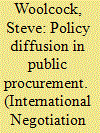

|
|
|
|
|
| Publication |
2013.
|
| Summary/Abstract |
Abstract This article assesses the factors shaping policy diffusion of effective, liberal public procurement regimes. Policy diffusion and the analysis of policy diffusion is less developed in public procurement than other policy areas such as investment. This is surprising given the potential economic (public procurement accounts for some 8% of GDP) and signaling (transparency, good governance) gains of adopting regimes that promote competition in public procurement markets. The article first provides an introduction to the issue of public procurement and discusses the nature of procurement regimes, the dependent variable. It then assesses the impact of key variables identified in the literature on policy diffusion, such as competition, coercion and norm emulation. It is argued that issue linkage in bilateral free trade agreements (FTA) appears to have brought about common laws - and in some cases - rules for procurement. But this stops short of a genuine diffusion of liberal procurement regimes due to negotiations being framed by reciprocity rather than efficiency considerations, the costs and complexity of implementation, as well as opposition from vested sector interests and politicians at all levels of government favoring the short term political utility of 'buy local' policies.
|
|
|
|
|
|
|
|
|
|
|
|
|
|
|
|
| 5 |
ID:
120714
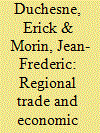

|
|
|
|
|
| Publication |
2013.
|
| Summary/Abstract |
Abstract This special issue investigates the new landscape of regional trade and economic negotiations. Contributors to this issue propose innovative theories and models to tackle an increasingly intricate web of trade-related issues that confront modern-day negotiators. In particular, they explore the structure, process and regional-international nexus of international trade and economic negotiations.
|
|
|
|
|
|
|
|
|
|
|
|
|
|
|
|
| 6 |
ID:
120715
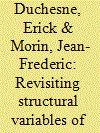

|
|
|
|
|
| Publication |
2013.
|
| Summary/Abstract |
Abstract This article offers a conceptual analysis of the negotiation of the Comprehensive Economic and Trade Agreement (CETA) between Canada and the European Union. It argues that traditional accounts of the structure of trade negotiations must be tailored for their novel nature, especially their wider scope on various regulatory issues and the relative economic weight of trading partners. To build our argument, we revisit traditional structural factors such as economic interdependence, non-agreement alternatives (NAA), institutional constraints, outcome valuations, and domestic support. We conclude that current and future bilateral trade negotiations will likely last longer, deadlocks will likely become more frequent, and that variations in scope will likely increase.
|
|
|
|
|
|
|
|
|
|
|
|
|
|
|
|
| 7 |
ID:
120716
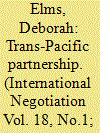

|
|
|
|
|
| Publication |
2013.
|
| Summary/Abstract |
Abstract Much has been made of the "spaghetti or noodle bowl" problem of overlapping preferential trade agreements (PTA). A new PTA, the Trans-Pacific Partnership (TPP), currently under negotiation between eleven states - Australia, Brunei, Canada, Chile, Malaysia, Mexico, New Zealand, Peru, Singapore, the United States and Vietnam - is intended to help address this issue. The TPP will lower or eliminate barriers to trade among the partners. But officials are not operating in a vacuum as they negotiate this new agreement. Instead, they must contend with rules created in previous agreements, many of which link TPP partners together in ways that constrain their options now. This article looks in detail at negotiations over market access in goods to better understand the tradeoffs faced by negotiators. Unfortunately, some of the decisions made so far after three years of talks suggest that the TPP market access deal could end up being just another twisted noodle in a crowded bowl.
|
|
|
|
|
|
|
|
|
|
|
|
|
|
|
|
| 8 |
ID:
120719
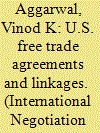

|
|
|
|
|
| Publication |
2013.
|
| Summary/Abstract |
Abstract This article examines the driving factors that account for patterns of linkages to broader economic, labor, environmental, and security issues in U.S. Free Trade Agreements (FTAs). Rather than only emphasizing trade benefits or security considerations as in much recent work on FTAs, this analysis provides a richer empirical picture by focusing on the full universe of U.S. FTAs. It conceptually differentiates among different issues that might be linked to FTAs and categorizes different patterns of U.S. FTAs based on the key issues that drove negotiations. The article then examines these negotiations from a theoretical standpoint, focusing on three elements. First, it examines the degree to which linkages in the U.S. domestic policymaking process are top-down or bottom-up. Second, it considers linkages types in terms of the underlying basis for issue connections - either power or knowledge. Third, it more briefly examines the bargaining process. The conceptual and theoretical analysis is buttressed through an examination of various illustrative cases of U.S. FTA negotiations to demonstrate the utility of this approach to illuminate the variety of 'linkage packages' that have driven U.S. FTAs. We conclude with the broader implications of linkages politics in FTAs.
|
|
|
|
|
|
|
|
|
|
|
|
|
|
|
|
| 9 |
ID:
120717
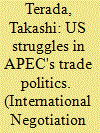

|
|
|
|
|
| Publication |
2013.
|
| Summary/Abstract |
Abstract From a perspective of change in the institution's function, the history of the Asia-Pacific Economic Cooperation (APEC) can be divided into four periods: 1989-1995, 1996-2001, 2001-2006, and 2007-present. APEC's activities in each of these periods have been organized around major themes: respectively, the establishment of guidelines for liberalization; the implementation of liberalization measures; security issues such as counter-terrorism; and the establishment of a free trade area. American political will can be seen as a major driving force behind these changes in APEC's agenda-setting. However, norm setting during the first and second periods encountered objections from China and Japan, respectively. During the third period, the Bush administration's interest in combating terrorism through APEC was not supported by Asian members, who emphasized APEC's primary role as a framework for economic cooperation, instead placed higher priorities on East Asian regionalism that excluded the US. In light of this shift, in the fourth period, the US once again urged that APEC should be used as a framework for liberalization and pushed for the Trans-Pacific Partnership (TPP). This period saw the discriminatory, legally-binding and reciprocity-based norms for trade liberalization take root in APEC, resulting largely from the American coalition-building approach through the promotion of the TPP as an existing integration framework. This has helped to create a critical mass while competition with China over regional trade policies becomes more intense, demonstrating the case where the US successfully set its own preferred agenda and norm together for the first time.
|
|
|
|
|
|
|
|
|
|
|
|
|
|
|
|
|
|
|
|
|